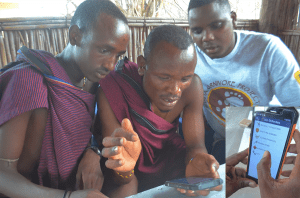

Lion Landscapes believes that people are central to the long-term conservation of lions. We’re proud to help them in this mission.
When we shared the part our Zoo would play in lion conservation in AZA-accredited facilities, we knew that we wanted to continue to help this species in its natural range as well. Partnering with Lion Landscapes allowed us to do this while also following our mission to share our joy of nature to help wildlife and people thrive.

Lion Landscapes trains Lion Rangers to use a mobile phone application to collect data and report incidences in the field.
Lion Landscapes believes that people are central to the long-term conservation of lions. This nonprofit organization coordinates a host of programs across Tanzania, Kenya and Zambia with the goal of reducing the harm communities feel from sharing space with lions.
The organization does this through programs that help people protect their livestock while keeping lions and other wildlife safe. Lion Rangers, protected GPS tracking of lions and community coexistence training all help work toward this goal.
Brevard Zoo will fund eight $2,000 scholarships for middle and high school students whose families own livestock in the areas Lion Landscapes affects. This will cover four full years of schooling for each student.
“This helps enable our conservation work, and crucially – by supporting things like scholarships for promising students – ensures that local people can achieve a brighter future through conservation investment,” said co-CEO Dr. Amy Dickman.
Lion Landscapes will also receive $5,000 for other programs as needed, including real-time collared-lion tracking. The collared lion movements are shared with the local community as needed so that livestock owners can plan accordingly and move their animals if needed, accommodating both the natural behaviors of the lions and the welfare of the livestock, which is the livelihood of the locals.
While we continue to support and take part in local conservation needs, our Quarters for Conservation program allows us – and you – to help people and animals around the globe.
For Dickman and her co-CEO Alayne Cotterill, their decades in the field showed them the importance of changing the presence of wildlife from a negative to a tangible positive for local people. A globally valued species like lions can be an asset to communities, if that global value can be felt on a local level, said Cotterill.
“Working out potential ways to do that requires deep trust and understanding with the people concerned, as it is their priorities which must be met through conservation,” Cotterill said.
“Ultimately, it is up to people whether lions, wildlife and habitat will be conserved, so we put people at the heart of our conservation.”
Brevard Zoo is an independent, not-for-profit organization that receives no recurring government funding for our operating costs. Your generous support enables us to continue to serve our community and continue our vital animal wellness, education and conservation programs.
